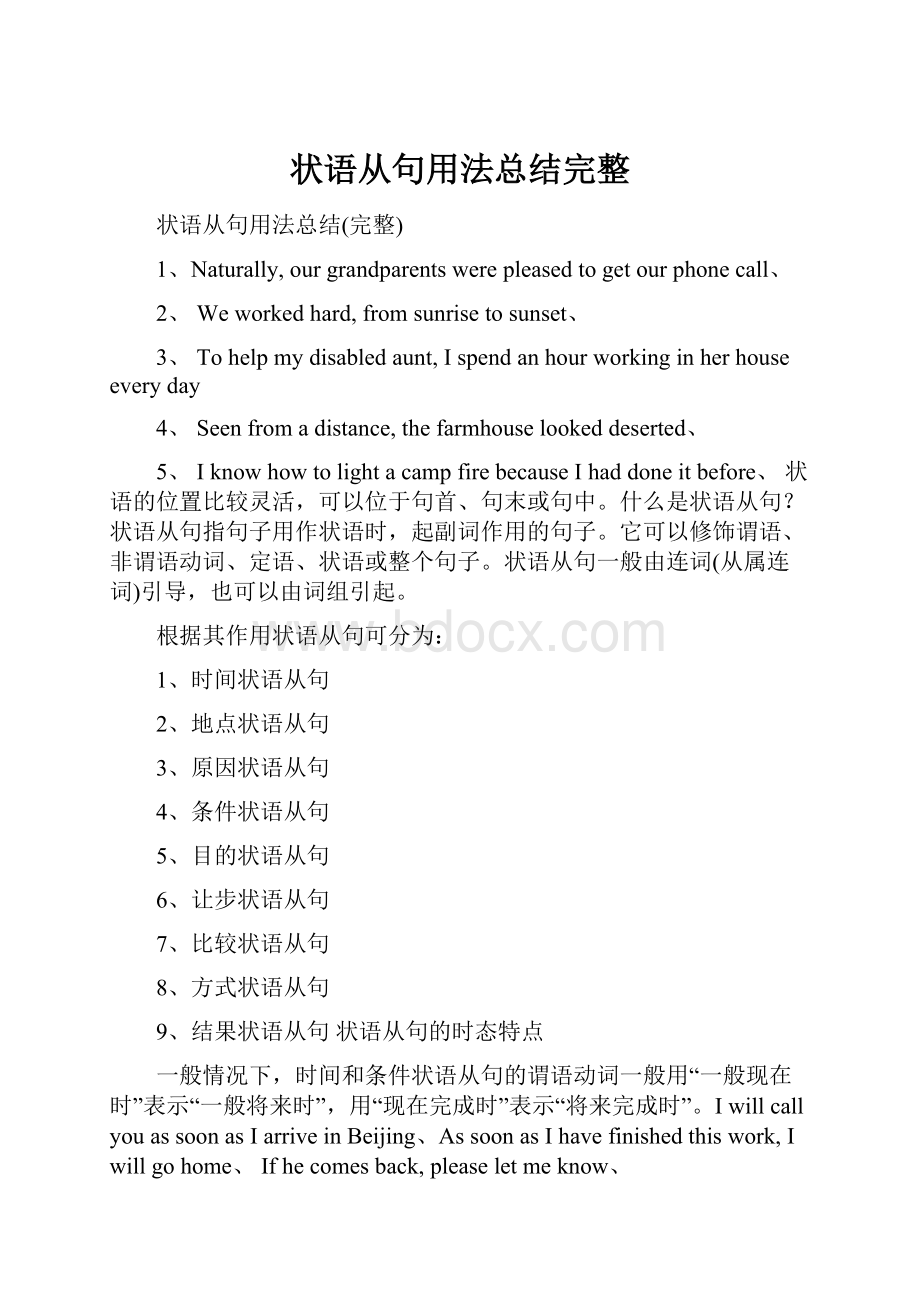状语从句用法总结完整.docx
《状语从句用法总结完整.docx》由会员分享,可在线阅读,更多相关《状语从句用法总结完整.docx(10页珍藏版)》请在冰豆网上搜索。

状语从句用法总结完整
状语从句用法总结(完整)
1、Naturally,ourgrandparentswerepleasedtogetourphonecall、
2、Weworkedhard,fromsunrisetosunset、
3、Tohelpmydisabledaunt,Ispendanhourworkinginherhouseeveryday
4、Seenfromadistance,thefarmhouselookeddeserted、
5、IknowhowtolightacampfirebecauseIhaddoneitbefore、状语的位置比较灵活,可以位于句首、句末或句中。
什么是状语从句?
状语从句指句子用作状语时,起副词作用的句子。
它可以修饰谓语、非谓语动词、定语、状语或整个句子。
状语从句一般由连词(从属连词)引导,也可以由词组引起。
根据其作用状语从句可分为:
1、时间状语从句
2、地点状语从句
3、原因状语从句
4、条件状语从句
5、目的状语从句
6、让步状语从句
7、比较状语从句
8、方式状语从句
9、结果状语从句状语从句的时态特点
一般情况下,时间和条件状语从句的谓语动词一般用“一般现在时”表示“一般将来时”,用“现在完成时”表示“将来完成时”。
IwillcallyouassoonasIarriveinBeijing、AssoonasIhavefinishedthiswork,Iwillgohome、Ifhecomesback,pleaseletmeknow、
1、时间状语从句
常用引导词:
when,as,while,assoonas,before,after,since,till,until
特殊引导词:
theminute,themoment,thesecond,everytime,theday,theinstant,immediately,directly,nosooner…than,hardly…when,scarcely…when Ididn’trealizehowspecialmymotherwasuntilIbecameanadult、 WhileJohnwaswatchingTV,hiswifewascooking、 Thechildrenranawayfromtheorchard(果园),themomenttheysawtheguard NosoonerhadIarrivedhome,thenitbegantorain、EverytimeIlistentoyouradvice,Igetintotrouble、表示“一……就……”除assoonas外,还有三类:
名词型themoment,theminute,thesecond,theinstant;副词型immediately,directly,instantly;句式型nosooner…than…,hardly/scarcely…when…ThemomentIsawhim,Ifellinlovewithhim、Icameimmediatelyyoucalled、你一给我打电话,我就马上来。
Ihadnosoonergothomethanitbegantorain、我一到家,就开始下雨。
【注意】
如果hardly,scarcely或nosooner置于句首,句子必须用倒装结构。
Hardly/ScarcelyhadIgothomewhenitbegantorain、NosoonerhadIgothomethanitbegantorain、在时间状语从句中,不能用一般将来时、过去将来时态或将来完成时,而要用相应的一般现在时态、一般过去时或现在完成时来代替。
When,while,as(一边、、、一边、、、),after,before,assoonas,since,till/until,bythetime(到。
。
。
为止,所在句子的主句应用完成时)
Mozartstartedwritingmusicwhenhewasfouryearsold、
Hevisitedalotofplaceswhilehewastraveling、 Helefttheclassroomafterhehadfinishedhishomeworktheotherday、when,while和as的区别
when引导的从句的谓语动词可以是延续性的动词,又可以是瞬时动词。
并且when有时表示“就在那时”,when=andthen;atthatmoment。
Whenshecamein,Istoppedeating、
WhenIlivedinthecountryside,Iusedtocarrysomewaterforhim、Wewereabouttoleavewhenhecamein、While引导的从句的谓语动词必须是延续性的,并强调主句和从句的动作同时发生(或者相对应)。
并且while有时还可以表示对比。
Whilemywifewasreadingthenewspaper,IwaswatchingTV、
Ilikeplayingfootballwhileyoulikeplayingbasketball、
As表示“一边……一边”,as引导的动作是延续性的动作,一般用于主句和从句动作同时发生;as也可以强调“一先一后。
Wealwayssingaswewalk、
Aswewasgoingout,itbegantosnow、before和after引导的时间状语从句before的本意为“在……之前”,根据具体语境还可理解为“还没来得及/还没有……就……,趁着还没……就……,不知不觉就……,……才……”等。
After表示主句动作发生在从句动作之后。
Itwillbefourdaysbeforetheycomeback、Einsteinalmostknockedmedownbeforehesawme、MyfatherhadleftforCanadajustbeforetheletterarrived、Theyhadnotbeenmarriedfourmonthsbeforetheyweredivorced、Afteryouthinkitover,pleaseletmeknowwhatyoudecide、Afterwehadfinishedthework,wewenthome、till或until引导的时间状语从句till和until一般情况下两者可以互换,但是在强调句型中多用until。
如果主句中的谓语动词是瞬时动词时,必须用否定形式;如果主句中的谓语动词是延续性动词时,用肯定或否定形式都可以,但表达的意思不同。
Ididntgotobeduntil(till)myfathercameback、 ItwasnotuntilthemeetingwasoverthathebegantoteachmeEnglish、 Iworkeduntilhecameback、我工作到他回来为止。
Ididntworkuntilhecameback、他回来我这才开始工作。
由since引导的时间状语从句。
since引导的从句的谓语动词可以是延续性的动词,又可以是瞬时动词。
一般情况下,从句谓语动词用一般过去时,而主句的谓语动词用现在完成时。
但在Itis+时间+since从句的句型中,主句多用一般现在时。
IhavebeeninBeijingsinceyouleft、WherehaveyoubeensinceIlastsawyou?
ItisfouryearssincemysisterlivedinBeijing、我妹妹不在北京住有四年了。
ItisfivemonthssinceourbosswasinBeijing、我们老板离开北京有五个月了。
2、地点状语从句
常用引导词:
where
特殊引导词:
wherever,anywhere,everywhere
Generally,airwillbeheavilypollutedwheretherearefactories、
Whereveryougo,youshouldworkhard、
句型1:
Where+地点从句,(there)+主句。
Wherethereisnorain,farmingisdifficultorimpossible、Theyweregoodpersons、Wheretheywent,theretheywerewarmlywelcomed、Youshouldhaveputthebookwhereyoufoundit、WheretheCommunistPartyofChinagoes,therethepeopleareliberated、
句型2:
Anywhere/wherever+地点从句,+主句。
Wherevertheseais,youwillfindseamen、
3、原因状语从句
常用引导词:
because,since,as,for特殊引导词:
seeingthat(由于,鉴于),nowthat(既然),inthat,consideringthat(考虑到),giventhat(考虑到)、
MyfriendsdislikemebecauseI’mhandsomeandsuccessful、
Nowthateverybodyhascome,let’sbeginourconference、Consideringthatheisnomorethan12yearsold,hisheightof
1、80misquiteremarkable、Seeingthatyou’realreadyatthedoor,IsupposeImustinviteyouinside、Consideringhe’sonlysixteenyearold,heisnotfitforthejob、Giventhatsheisinterestedinchildren,Iamsureteachingistherightcareerforher、because,since,as,for辨析1)because语势最强,用来说明人所不知的原因,回答why提出的问题。
当原因是显而易见的或已为人们所知,就用as或since。
Ididn’tgo,becauseIwasafraid、
Since/Astheweatherissobad,wehavetodelayourjourney、2)由because引导的从句如果放在句末,且前面有逗号,则可以用for来代替。
但如果不是说明直接原因,而是多种情况加以推断,就只能用for。
Heisabsenttoday,because/forheisill、
Hemustbeill,forheisabsenttoday、3)
as和for的区别:
通常情况下,as引导的从句在主句前,for引导的从句在主句后。
Astheweatheriscold,Istayathome、(同义句)
Istayathome,fortheweatheriscold、
4、目的状语从句
常用引导词:
sothat,inorderthat特殊引导词:
lest,incase,forfearthat,inthehopethat,forthepurposethat,totheendthatThebossaskedthesecretarytohurryupwiththeletterssothathecouldsignthem、Theteacherraisedhisvoiceonpurposethatthestudentsinthebackcouldhearmoreclearly、
5、结果状语从句
常用引导词:
so…that,such…that,特殊引导词:
suchthat,tothedegreethat,totheextentthat,tosuchadegreethat,(such是形容词,修饰名词或名词词组,so是副词,只能修饰形容词或副词。
)
Hegotupsoearlythathecaughtthefirstbus、
It’ssuchagoodchancethatwemustnotmissit、
Tosuchadegreewasheexcitedthathecouldn’tsleeplastnight、
6、条件状语从句
常用引导词:
if,unless,
特殊引导词:
as/solongas,onlyif,providing/providedthat,supposingthat,incasethat,onconditionthat
We’llstartourprojectifthepresidentagrees、
Youwillcertainlysucceedsolongasyoukeepontrying、Providedthatthereisnoopposition,weshallholdthemeetinghere、条件状语从句和时间状语从句一样,从句的谓语动词不能用一般将来时态、过去将来时态或将来完成时,而要用相应的一般现在时、一般过去时和现在完成时来替代。
Tellmeincaseyougetintodifficulty、Supposinghedoesnotcome,shallwegowithouthim?
7、让步状语从句
常用引导词:
though,although,evenif,eventhough
特殊引导词:
as(用在让步状语从句中必须要倒装),while(一般用在句首),nomatter…,inspiteofthefactthat,while,whatever,whoever,wherever,whenever,however,whichever
MuchasIrespecthim,Ican’tagreetohisproposal、
Theoldmanalwaysenjoysswimmingeventhoughtheweatherisrough、Nomatterhowhardhetried,shecouldnotchangehermind、as,though引导的倒装句as/though引导的让步从句必须表语或状语提前(形容词、副词、分词、实义动词提前)。
Childas/thoughhewas,heknewwhatwastherightthingtodo、
=Thoughhewasasmallchild,heknewwhatwastherightthingtodo、
注意:
a、 句首名词不能带任何冠词。
b、 句首是实义动词,其他助动词放在主语后。
如果实义动词有宾语和状语,随实义动词一起放在主语之前。
Tryhardashewill,heneverseemsabletodotheworksatisfactorily、
=Thoughhetrieshard,heneverseems…nomatterwho=whoever
nomatterwhen=whenever
nomatterwhere=wherever
nomatterwhich=whichever
nomatterhow=however注意:
nomatter不能引导主语从句和宾语从句。
(错)Nomatterwhatyousayisofnousenow、
(对)Whateveryousayisofnousenow、
(错)Prisonershavetoeatnomatterwhatthey’regiven,(对)Prisonershavetoeatwhateverthey’regiven、
8、比较状语从句
常用引导词:
as(同级比较),than(不同程度的比较)
特殊引导词:
themore…themore…;justas…,so…;AistoBwhat/asXistoY;no…morethan;notAsomuchasB
Sheisasbad-temperedashermother、
Themoreyouexercise,thehealthieryouwillbe、Foodistomenwhatoilistomachine、nomorethan只不过(嫌少的意思)
notmorethan不如。
。
。
(前者不如后者)Ihavenomorethantwopens、It’snomorethanamiletotheshops、JackisnotmorediligentthanJohn、oneofthe+名词(复数)…、之一(用于最高级)
HanMeiisoneofthebeststudentsinourschool、9、方式状语从句
常用引导词:
as,(just)
as…so…,asif/though("正如…","就像")
特殊引导词:
theway
WheninRome,doastheRomando、
Shebehavedasifsheweretheboss、
Sometimesweteachourchildrenthewayourparentshavetaughtus、 asif,asthough
两者的意义和用法相同,引出的状语从句谓语多用虚拟语气,表示与事实相反,有时也用陈述语气,表示所说情况是事实或实现的可能性较大。
汉译常作"仿佛……似的","好像……似的" Theycompletelyignorethesefactsasif(asthough)
theyneverexisted、Helooksasif(asthough)
hehadbeenhitbylighting、状语从句的省略状语从句同时具备下列两个条件:
①主句和从句的主语一致,或从句主语为it;②从句主要动词是be的某种形式。
从句中的主语和be动词常可省略。
When(themuseumis)
completed,themuseumwillbeopentothepublicnextyear、
He’llgototheseasideforhisholidayif(itis)
possible、
另外,比较状语从句经常省略。
I’mtallerthanhe(istall)、Thehigherthetemperature(is),thegreaterthepressure(is)、状语从句的"省略"现象常存在于以下五种状语从句中:
①由if,unless等引导的条件状语从句;②由although,though,evenif/though等引导的让步状语从句;③由when,while,as,before,after,until/till等引导的时间状语从句;④由as,asif等引导的方式状语从句;⑤由as,than等引导的比较状语从句。
下面针对这五种情形作归纳。
(1)当状语从句的主语是it,且谓语动词是be时,it和be要完全简化掉。
If(itis)
possible,hewillhelpyououtofthedifficulty、Youmustattendthemeetingunless(itis)
inconvenienttoyou
(2)当状语从句的主语和主句的主语一致时,从句可以将主语和be动词简化掉。
常用于以下几种情形:
a、连词+形容词
As(hewas)
young,helearnedhowtorideabike、
Whenever(sheis)
free,sheoftengoesshopping、
Workhardwhen(youare)
young,oryoullregret、
b、连词+名词
While(hewas)
ayoungboy,hewasalwaysreadytohelpothers、
Although(hewas)
afarmer,nowheisafamousdirector、
c、连词+现在分词
As(shewas)
walkingalongtheriverbank,shewassingingapopsong、
Although(heis)
doinghisbestinmathsthesedays,hehasstillgotnogoodmarks、
d、连词+过去分词
Hewontgotherewithusunless(heis)
invited、
Theconcertwasagreatsuccessthan(itwas)
expecte